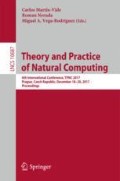Abstract
In this paper, the identification problem of diploid Cellular Automata is considered, in which, based on a series of observations, the underlying cellular automaton rules are to be uncovered. A solution algorithm based on a statistical parameter estimation method using a normal distribution approximation is proposed. The accuracy of this method is verified in a series of computational experiments.
Access this chapter
Tax calculation will be finalised at checkout
Purchases are for personal use only
References
Adamatzky, A.: Identification of cellular automata. In: Meyers, R.A. (ed.) Computational Complexity: Theory, Techniques, and Applications, pp. 1564–1575. Springer, New York (2012)
Bołt, W., Baetens, J.M., De Baets, B.: On the decomposition of stochastic cellular automata. J. Comput. Sci. 11, 245–257 (2015)
Bołt, W., Wolnik, B., Baetens, J.M., De Baets, B.: On the identification of \(\alpha \)-asynchronous cellular automata in the case of partial observations with spatially separated gaps. In: de Trė, G., Grzegorzewski, P., Kacprzyk, J., Owsiński, J.W., Penczek, W., Zadrożny, S. (eds.) Challenging Problems and Solutions in Intelligent Systems, pp. 23–36. Springer, Cham (2016). https://doi.org/10.1007/978-3-319-30165-5_2
Brown, L.D., Cai, T.T., DasGupta, A.: Interval estimation for a binomial proportion. Stat. Sci. 16(2), 101–133 (2001)
Das, D.: A survey on cellular automata and its applications. In: Krishna, P.V., Babu, M.R., Ariwa, E. (eds.) ObCom 2011. CCIS, vol. 269, pp. 753–762. Springer, Heidelberg (2012). https://doi.org/10.1007/978-3-642-29219-4_84
Fatès, N.: Diploid cellular automata: first experiments on the random mixtures of two elementary rules. In: Dennunzio, A., Formenti, E., Manzoni, L., Porreca, A.E. (eds.) AUTOMATA 2017. LNCS, vol. 10248, pp. 97–108. Springer, Cham (2017). https://doi.org/10.1007/978-3-319-58631-1_8
Fatès, N., Morvan, M.: An experimental study of robustness to asynchronism for elementary cellular automata. Complex Syst. 16, 1–27 (2005)
Mendonça, J., de Oliveira, M.: An extinction-survival-type phase transition in the probabilistic cellular automaton \(p182-q200\). J. Phys. A: Math. Theor. 44 (2011). Article ID 155001
Wolfram, S.: Statistical mechanics of cellular automata. Rev. Mod. Phys. 55, 601–644 (1983)
Author information
Authors and Affiliations
Corresponding author
Editor information
Editors and Affiliations
Rights and permissions
Copyright information
© 2017 Springer International Publishing AG
About this paper
Cite this paper
Bołt, W., Bołt, A., Wolnik, B., Baetens, J.M., De Baets, B. (2017). A Statistical Approach to the Identification of Diploid Cellular Automata. In: Martín-Vide, C., Neruda, R., Vega-Rodríguez, M. (eds) Theory and Practice of Natural Computing. TPNC 2017. Lecture Notes in Computer Science(), vol 10687. Springer, Cham. https://doi.org/10.1007/978-3-319-71069-3_3
Download citation
DOI: https://doi.org/10.1007/978-3-319-71069-3_3
Published:
Publisher Name: Springer, Cham
Print ISBN: 978-3-319-71068-6
Online ISBN: 978-3-319-71069-3
eBook Packages: Computer ScienceComputer Science (R0)

